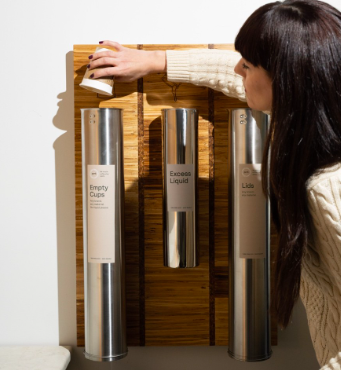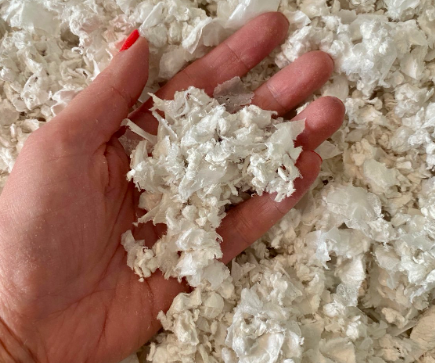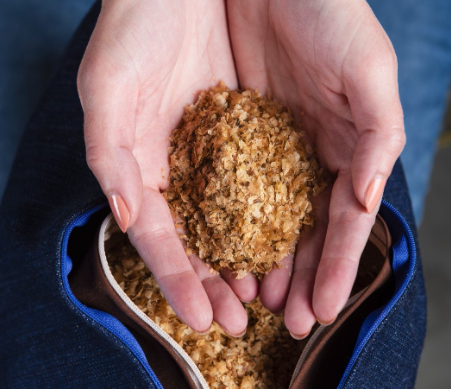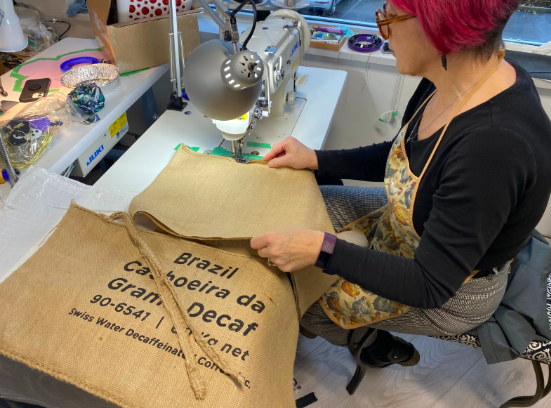Circular Solutions for Coffee-Related Waste
58 billion coffee cups go to landfill every year. Jennifer Henry, founder and CEO of Perk Eco, outlines some innovative solutions for upcycling of coffee cups, coffee bean bags, and other coffee shop waste items.
Coffee cups are made from a high-quality, desirable paper fibre. With Perk Eco’s national cup recycling program, those cups become a resource to be made into circular consumer goods, rather than downcycled or landfilled. We innovated a way to recycle the whole cup, including the troublesome plastic liner.
When we set out to tackle this problem, we recognized that not only did we need to improve upon the recycling industry status quo of downcycling the cups into more single-use products like tissue, toilet paper, and magazines, but we needed to make our service available Canada-wide, since most traditional recycling companies here do not accept cups.
Perk Eco’s program considered the chain of custody of the humble coffee cup and built the program around the convenience of the coffee shop customer, owner, and barista. The status quo is for the coffee shop customer to put their coffee cup in one of two places; the garbage, or the recycling bin, if one is provided. What happens in either case is that the barista takes the bag out of the bins at the end of the day with a puddle of coffee at the bottom. No recycling company will accept a bag containing liquid. When those bags get to the processor, they are picked out and sent to landfill.

Instead, Perk Eco offers a cup sorting station that has no bins and no plastic bags. It provides coffee drinkers 3 wall-mounted stainless-steel tubes; one to pour out excess liquid, one to stack their cup and sleeve, and one to stack their lid. Baristas then empty the tubes into a reusable Perk Eco nylon shipping bag that holds up to 1200 stacked cups. When the bag is full, Perk Eco sends a courier to pick up the bag.
Using an existing infrastructure of hybrid-electric couriers to pick up the bags from the coffee shops means we are not putting polluting garbage trucks on the road; it means any postal code in the country can be served; and it means coffee shops do not need messy bins or dumpsters.
“We compel coffee shops to join the movement to upcycle cups and divert 90% of their waste from landfill”
Traditional recycling removes the plastic liner from the cup and this plastic liner is sent for landfill or incineration. Typically, that material is polyethylene, which is made from oil, a non-renewable resource. Single-use non-renewable materials are seeing increased regulation from governments world-wide. The ubiquitous single-use cup is a prevalent item in landfill but has managed to escape bans and restrictions to date. While cup share programs and reusable cups are the best option, the single-use cup is a pervasive waste item that needs a large-scale end-of-life solution, today.

Perk Eco upcycles coffee cups into a soft goods filling for any product that would typically use polyester stuffing, the white plastic filling so commonly used in pillows, pet beds, stuffed animals, and furniture. Polyester stuffing is made from oil, with the only end-of-life solution being the landfill or incinerator. Upcycling the cups into this durable product means fewer soft goods in landfill. Perk Eco takes back used filling for reprocessing, making this a truly circular solution.

We continue to innovate for other coffee shop waste items as well, accepting 90% of coffee shop waste for recycling or composting, including compostable plastics. Most commercial composters do not accept these plastics, but we take the time to hand-separate them and put them through a pre-compost process in an anerobic digester machine, which turns them into an inert dirt-style medium that is a desirable compost ingredient.

We are looking at every waste item that coffee drinkers, coffee roasters, and coffee shops generate, from the burlap bean sack that we make into sandbags, to the plastic and foil bean bag, to the stir stick and the sugar packet. It all adds up, and so much of it is single-use that can be reused or upcycled. We have been successful in creating and selling a pet bed stuffing from the dry, soft husk of the coffee bean that is shed during roasting (called coffee chaff).
In 2022, an outreach campaign to Canadian coffee shops began, compelling them to join the movement to upcycle cups and divert 90% of their waste from landfill. We will continue to expand our reach and develop circular solutions for complex coffee-related waste streams. Up next for Perk Eco is expanding our Vancouver facilities to handle the volume of cups that Canadian coffee drinkers produce.














